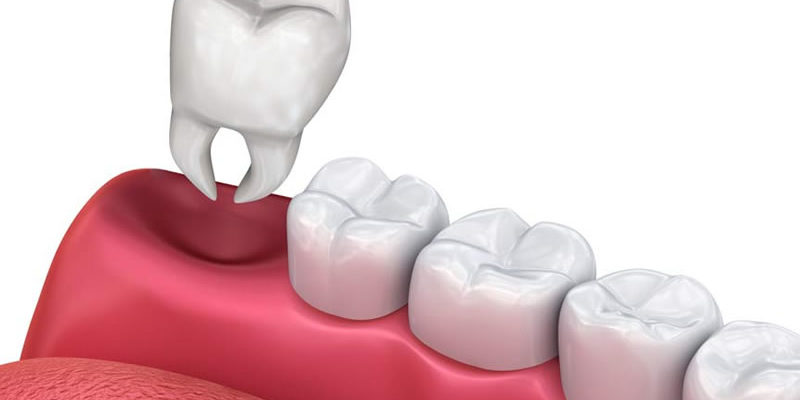Patients may be surprised when told they need a tooth extraction if they are not experiencing any pain or obvious signs of damage. However, there are many reasons someone may need to get a tooth extracted.
Every patient’s case is unique, and their dentist in Kelowna will examine their mouth with care to determine the best course of treatment. If a tooth extraction is needed, the reasons for extraction could be the following:
-
Impaction & Overcrowding
Teeth impaction typically happens due to overcrowding of teeth in the mouth. Teeth push one another and can create a variety of dental issues. If a patient is experiencing dental impaction, they may experience pain and discomfort. They may also notice swollen, bleeding gums from the overcrowding and, potentially, an infection.
One of the most common reasons for impacted teeth is the eruption of wisdom teeth from the gums. These teeth are also known as third molars and can grow to push front teeth and overcrowd the mouth. Getting tooth extractions in Kelowna and removing your wisdom teeth may prevent this issue.
-
Tooth Decay
Tooth decay is a very common reason for tooth extraction. If a patient neglects their teeth for a long period of time, bacteria may build up and cause infections that lead to decay. Bacteria buildup from leftover food particles promotes oral health issues that may lead to decay when left untreated. If this decay has expanded and infection has grown, it may affect the gums and root of your tooth. If the area is too infected and no longer able to support your oral health, your tooth may need to be removed and replaced.
Once a dentist examines your unique dental case and determines you will need a tooth extraction, it is recommended to support the space with artificial replacement teeth. There are many restorative treatments available for patients with missing teeth. Replacing the lost tooth will help restore regular mouth functions and enhance your smile after an extraction.
-
Gum Disease
Similar to tooth decay, gum disease can occur due to bacteria buildup. When the gums become infected, patients may experience swelling, pain and bleeding. The infection can grow to negatively impact the teeth, and if it advances, the tooth it affected may need to be extracted.
-
Physical Trauma
Physical trauma can occur from a variety of incidents. From playing sports to tripping during a walk, many activities can cause accidents that may damage your teeth. This trauma may cause severe damage to your teeth and require removal to restore your oral health.
The trauma will often be large enough to break or crack a tooth. Your smile may need another form of restoration due to trauma, but in some cases, damage to the root or extensive damage to the tooth itself may require extraction. If you have experienced physical trauma to the teeth, the best way to determine its gravity and what treatments will be necessary is to visit a dentist near you.
Aftercare of a Tooth Extraction
After tooth extraction surgery, there are a few things to keep in mind when caring for your teeth and to prevent further infection. Firstly, ensure you have safe transportation home from surgery, as you may be under the influence of anesthesia used to help with discomfort.
Once you are home, practice your oral hygiene routine with care to avoid irritating the area where surgery was performed. Your teeth and gums may be sensitive for a few days. Avoid eating hard foods and use the saltwater rinse to help with healing. Once the gums are healed, continue practicing good oral hygiene to avoid another infection that may lead to teeth extraction.
Do You Need a Tooth Extraction?
If you are unsure of whether or not you need a tooth extracted, we will be happy to assist you and help you determine the best course of treatment for you with a complimentary consultation. Our dental clinic offers tooth extraction near you, among other services, to help restore your oral health.
